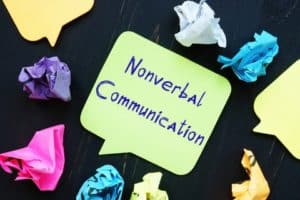
Bullies bully many of their targets long term, most over a period of years. Imagine what that does to the targets’ confidence and self-esteem. And sadly, it comes out in the targets’ body language.
Therefore, many targets of bullying are very nervous people, especially in social situations. And why not? Bullies have beaten them down- stripped them of their confidence, vibrance, their entire personhood. Is it any wonder they’re constantly walking on eggshells and monitoring every action and every word that comes out of their mouths?
It’s a crappy way to live when you’re always on guard.
Are they nervous and afraid or are they lying?
Consequently, many targets of bullying get accused by authority of lying about the bullying they suffer. Why? Because people all too often mistake nervousness and anxiousness for deception. If you’ve ever read “Othello,” by William Shakespeare, you’ll get a clearer picture of this heartbreaking scenario.

Many targets are often afraid to even look people in the eye, especially those with Asperger’s and on the Autism Spectrum. And being bullied to the point of lacking eye contact is a terrible thing. Although bad eye contact or complete lack of can, in fact signal deception, it’s usually not the case with targets. When a person is suffering from bullying or any type of abuse, it usually conveys nervousness and terror.
Therefore, we must look at context. Have we witnessed others consistently bullying and abusing the target? It’s too easy to confuse fear with deception if we aren’t careful.
Other signals of nervousness and fear are shaking, sweating, lip-licking and touching the face and neck. Again, targets of bullying are anxious. Who wouldn’t be if they were relentlessly bullied?
Before we make the snap judgement that the target is lying or has something to hide, we should always look for other nonverbals that go with it. Moreover, we must look at context- the circumstances in which the nervousness comes about.

Submissive Body Language
Many targets of bullying also display submissive body language. No surprise there. They have encountered bullies who have abused them so badly and for so long that they feel helpless. They bullying these targets have endured has rendered them powerless.
Therefore, these poor souls tend to be overly forgiving. They want to stay as far away from conflict or criticism as humanly possible because they already get enough of it in their bullying environments, be it at school, work, or home.
These targets will usually have a sheepish look on their faces. They also stay motionless to keep from drawing attention to themselves. Moreover, they tend to hold their heads down and look down all the time.
Protective Behaviors

Targets of bullying often have closed body language, such as crossing the arms in front of them crossing their legs or hunkering down into the shoulders and hiding the neck. This signals self-protection. Another thing they do is display bad posture by slouching.
This body language that targets display is so easy to spot, yet most people in authority either ignore it or don’t consider it. Worse even, it attracts bullies, users, and abusers!
Bullies can read this body language from a mile away and they will instantly think, “target!” and take full advantage.
It won’t be easy. However, if you’re a target of bullying, it is imperative that you watch your body language. And if you catch yourself displaying any of the above nonverbal cues, you must do your best to correct it.
How do You Stop Looking Like a Target?

When you catch yourself slouching, sit or stand up straight. If you see that you’re looking down, hold your head up and look ahead. Uncross your arms and legs, start making eye contact with people, and stop being overly forgiving. The last thing you want is to continue looking like bully-bait.
Begin seeing your worth and setting boundaries. Lose the sheepish look and replace it with the look of confidence.
Do these things and there’s a strong chance that your situation will improve drastically! And if you’re having difficultly, here are more ways you can buffer your self-esteem.
With knowledge comes empowerment!